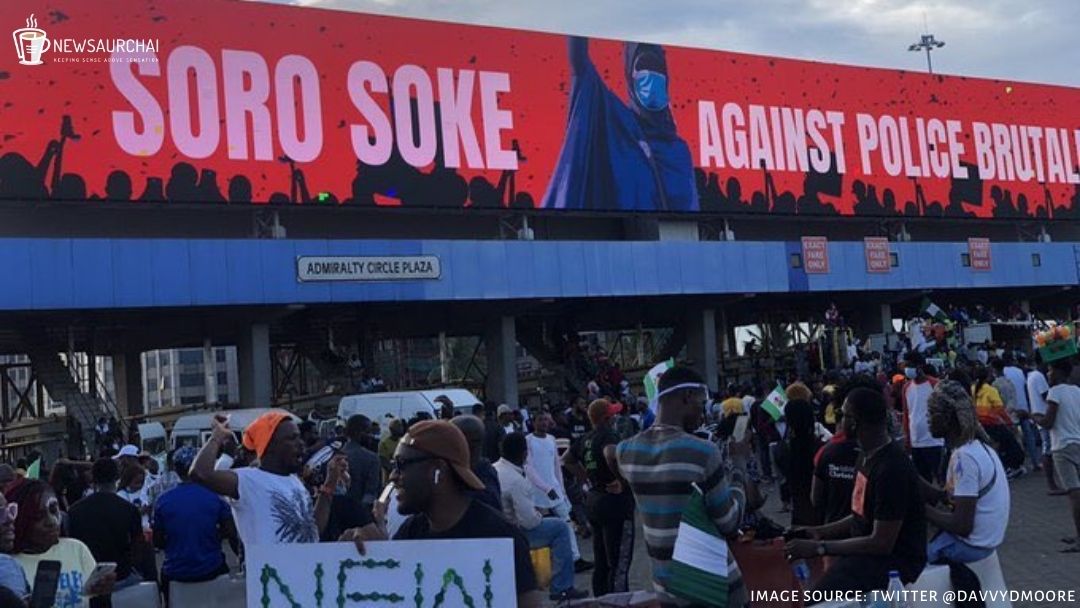
Approximately ten thousand people are protesting against the particular unit of police, Special Anti-Robbery Squad (SARS) over its ruthlessness in Nigeria and gaining more momentum since October 2020.
West African countries have also joined the social media campaign with the hashtag #EndSARS to showcase their rage, which roots beyond SARS into a much broader demand for better, peaceful and responsible governance.
Violence reached at its peak on October 20, when around 12 protestors were killed after security forces started open shooting at the protester as per Amnesty International. According to Amnesty, a total of 56 had died since the commencement of the protests.
What is #SARS?
What is the problem?
Why should we take part? #EndSARS #Nigeria #EndPoliceBrutality pic.twitter.com/E6pMPyRroo— Be A King (@BerniceKing) October 24, 2020
What is SARS?
Special Anti-Robbery Squad (SARS ) was initiated as a segment of Nigeria’s Police Force unit to handle street crimes such as robbery, motor vehicle theft, kidnapping etc. Their operation was modus operandi, meaning the SARS officials were to operate secretly in public. Throughout its control, the police unit was linked to several extrajudicial killings, extortion, torture, kidnapping, illegal trade, armed robbery, invasions, rape, child arrests etc.
This led to the Twitter campaign of END SARS in 2017 which turned into mass demonstrations by October 2020.
Nigeria must #EndSARS NOW and put an end to the horrific police brutality that has become all too common there. Unarmed and peaceful protesters need to be PROTECTED, not KILLED. pic.twitter.com/IpZP8u79EJ
— Ben Crump (@AttorneyCrump) October 24, 2020
Series of Event:
- October 8- Social Media’s provocation
A viral video on social media ignited the demonstrations in Nigeria that showed SARS officers murdering a man in the Delta state. The authorities claimed the video to be fake, and no actions were taken. This, in turn, commenced protest on October 8 in central Lagos with hundreds of youths and celebrities like Faz, Don Jazzy, Olu Jacobs protesting in front of the Lagos State Governor’s House.
- October 11: Dissolution of SARS
This motivated the government to dissolve SARS on October 11; however, the need of the protestors is beyond SARS now. The inspector general of police, Muhammed Adamu, said “SARS officers will be deployed to different units and operations.” The protestors want justice for the victims and a complete reform in the police force to ensure safety and accountability.
It is also seen that similar promises were made in 2017 and 2018 regarding SARS to the people that never became a reality. Protestors called government to be bluffing and continued blocking the central public infrastructure such as Lagos-Ibadan expressway.
- October 15: Army intervention
Protests continued in the capital Abuja as young people continued to march against police harassment. Nigerian Army had to intervene on October 15 and issued a press release warning all submissive elements as a threat to democracy.
The infamous hacktivist Anonymous hacked the official Twitter handle of the Nigerian National Broadcasting Commission and showed their support for the protest.
It looks like @YourAnonNews has hacked into Nigeria's National Broadcasting Commission's (@nbcgovng ) Twitter account.
The account is now posting messages of solidarity with the #EndSARS , #EndSWAT, #EndPoliceBrutality movement.#EndSARS pic.twitter.com/EA3eww1QEn
— Yemisi Adegoke (@briticoyemo) October 16, 2020
NBC eventually removed the hacked posts.
October 20: Lekki massacre
On October 20th night, officials of Nigerian Armed Forces openly shot at peaceful demonstrations at the Lekki toll gate in Lagos, Nigeria. It is alleged that CCTV Cameras at the toll gate and street lights were turned off when Army killed protestors inhumanly with 12 dead and 50 injured. The claims are much more by human rights organisations with disturbing video evidences.
#Lekki #LekkiProtest #Lekkitollgate #Lagos#Nigeria#EndSARS pic.twitter.com/yxqhtbVgmU
— Amnesty International Nigeria (@AmnestyNigeria) October 20, 2020
The state government initially refused to accept any claim but later admitted about 25 people had been wounded, but only one person had died.
The protests have disturbed the economy and daily life of Lagos, Nigeria’s commercial hub, and provoked the state governments to enforce a 24-hour curfew with citing COVID-19 as the reason.
Nigerian President on October 23, announced 51 civilians were killed in unrest following days of peaceful protests over police abuses and blamed “hooliganism” for the violence while affirming security forces used “extreme restraint.”
Authorities and Accountability:
Nigerian President Muhammadu Buhari ensured justice and police reforms while condemning the Leki attacks.
President @MBuhari: “I call on our youths to discontinue the street protests and constructively engage government in finding solutions. Your voice has been heard loud and clear and we are responding.” #PoliceReformNG
— Presidency Nigeria (@NGRPresident) October 22, 2020
However, the official Nigerian Army Twitter handle has called many social media news to be fake and claims that no soldiers were deployed.
International Outrage:
The United Nations Secretary-General Antonio calls for an end to reported police brutality and abuses in a released statemented by the spokesperson.
The UN High Commissioner for Human Rights Michelle Bachelet said: “Reports that CCTV cameras and lighting were deliberately disabled before the shooting are even more disturbing as, if confirmed, they suggest this deplorable attack on peaceful protestors was premeditated, planned and coordinated.”
Joe Biden, US presidential candidate, urged Nigeran authorities to “cease the violent crackdown on protesters. “
Economic Community of West African States, a multilateral union of 15 states in its press release condemned the act and asked the protestors to be non-violent in their means.
Beyonce, famous songwriter and singer, took a stance on her Instagram showing solidarity with Nigerians.
Similarly, Rihanna, Nicki Minaj, Jidenna and other celebrities condemned the act.
The END SARS movement has now gained worldwide attention with people from the UK, Ghana, Benin, Mali and other parts of the world are coming on to the streets to show their solidarity.





